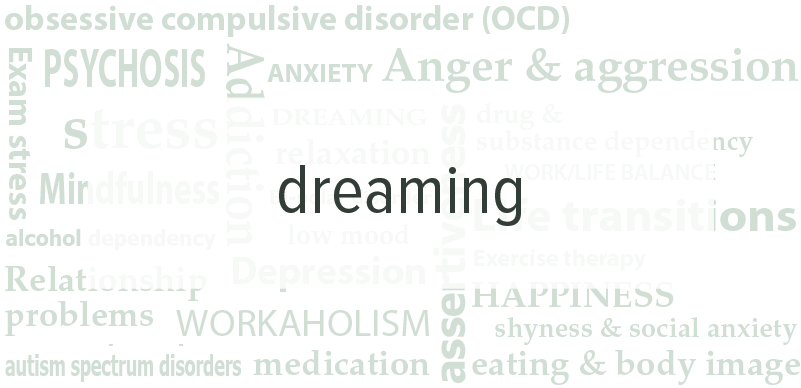Dreaming
Dreaming is something we all do, every night, irrespective of whether we remember our dreams or not.
When we sleep we go fluctuate through phases of light and deep sleep. One stage of sleep is called REM (rapid eye movement) sleep because our eyes move back and forth quickly. REM occurs about every 90 to 100 minutes and can last as long as 45 minutes. Dreams during this phase can be vivid and we are more likely to remember them, particularly if we are woken during them.
Dreams can very powerful and upsetting, particularly if we attach meaning to them. Our dreams are a combination of our lives and worries which our brain makes into a story using the events, people and objects encountered during the day. We must be careful not to read too much into these stories as this can cause real upset.
Reasons for dreaming
Nobody knows for sure why we dream, but it is clear that dreaming is necessary. Experiments that have deprived people of dreaming have resulted in problems such as hallucinations and an inability to concentrate.
One theory is that we simulate situations in our dreams to prepare us for dealing with them in reality. Another theory is that dreaming occurs as our brains sort out and consolidate information.
One psychologist recently suggested that dreaming is the mechanism by which we express the emotions aroused in our minds. So for example, we may be upset by thoughts created in our heads, which we then express in our dreams. This theory, if correct, has implications for understanding depression.
Dreams, depression and anxiety
Depressed people are known to have excessive REM sleep. This may be because their brains process a great deal of negative thought, which then has to be cleared at night. However, dreaming is not a restful activity. It is called ‘paradoxical sleep’ because our brain wave patterns are similar to those when completely awake. Your brain believes the dream to be reality and stress hormones will be active in the body. Therefore, if you are over-dreaming, you are flooding your body with stress hormones.
Challenging dreams
If your dreams are making you feel exhausted, worried or depressed, they may be aggravated by negative ruminations. Therapy is a good way to change negative thought patterns – particularly cognitive therapies which aim to change unhelpful negative thoughts.
Feel free to contact us to ask about psychological therapies available at our centres that may help with sleep problems or issues related to dreaming.

